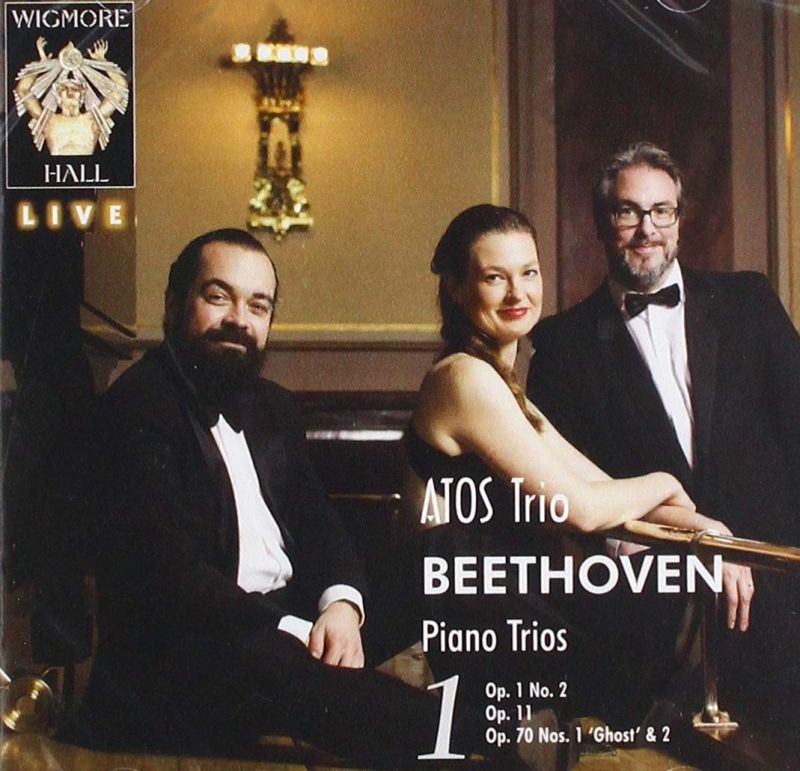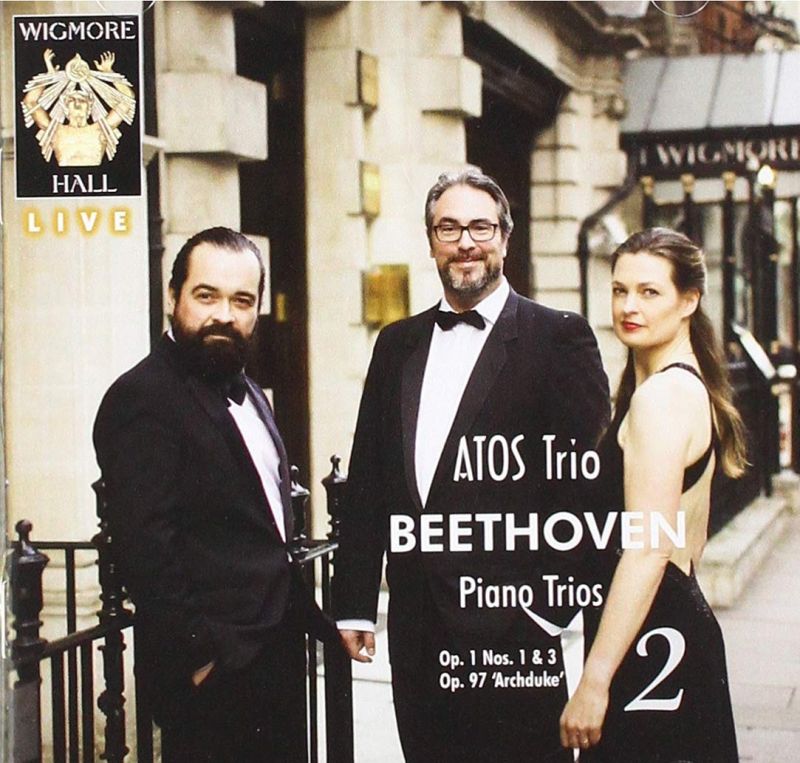BEETHOVEN Piano Trios (ATOS Trio)
View record and artist detailsRecord and Artist Details
Composer or Director: Ludwig van Beethoven
Genre:
Chamber
Label: Wigmore Hall Live
Magazine Review Date: 01/2020
Media Format: CD or Download
Media Runtime: 110
Mastering:
DDD
Catalogue Number: WHLIVE0094/2

Tracks:
| Composition | Artist Credit |
|---|---|
| Piano Trios, Movement: No. 2 in G, Op. 1/2 |
Ludwig van Beethoven, Composer
ATOS Trio Ludwig van Beethoven, Composer |
| Piano Trios, Movement: No. 5 in D, Op. 70/1, 'Ghost' |
Ludwig van Beethoven, Composer
ATOS Trio Ludwig van Beethoven, Composer |
| Piano Trios, Movement: No. 4 in B flat, Op. 11 (clarinet (or violin), piano and cello) |
Ludwig van Beethoven, Composer
ATOS Trio Ludwig van Beethoven, Composer |
| Piano Trios, Movement: No. 6 in E flat, Op. 70/2 |
Ludwig van Beethoven, Composer
ATOS Trio Ludwig van Beethoven, Composer |
Composer or Director: Ludwig van Beethoven
Genre:
Chamber
Label: Wigmore Hall Live
Magazine Review Date: 01/2020
Media Format: CD or Download
Media Runtime: 101
Mastering:
DDD
Catalogue Number: WHLIVE0095/2

Tracks:
| Composition | Artist Credit |
|---|---|
| Piano Trios, Movement: No. 1 in E flat, Op. 1/1 |
Ludwig van Beethoven, Composer
ATOS Trio Ludwig van Beethoven, Composer |
| Piano Trios, Movement: No. 3 in C minor, Op. 1/3 |
Ludwig van Beethoven, Composer
ATOS Trio Ludwig van Beethoven, Composer |
| Piano Trios, Movement: No. 7 in B flat, Op. 97, 'Archduke' |
Ludwig van Beethoven, Composer
ATOS Trio Ludwig van Beethoven, Composer |
Author: Rob Cowan
Coincidentally, just prior to hearing these two double-packs, I’d received a reissue from First Hand Records of the First and Third Trios featuring the George Malcolm Trio recorded in 1976, an immaculate production sound-wise, warmly and thoughtfully played and providing an ideal point of comparison with the Atos Trio. Right from the opening bars of the First Trio, major differences are apparent, the lively Malcolm ensemble telling it as it is, the Atos bounding in on a spread chord, before embracing the opening Allegro with all manner of varied nuances.
Note that I write ‘manner’ and not ‘mannered’, which they virtually never are, more proponents of conversational teamwork, with especially elegant piano-playing from Thomas Hoppe (Op 1 No 1’s second movement is a good place to sample). The witty finale is taken at a real lick yet never sounds rushed, whereas for the Third Trio’s tense opening vibrato is all but suspended. The mood lightens for the lovely second subject but without a dip in tempo. Malcolm’s trio are similarly attentive if rather more urbane. The Atos are perhaps at their best in the Second (G major) Trio, the opening especially, while Hoppe’s expressive phrasing at the start of the Largo con espressione slow movement is deeply affecting, as is the way the strings pick up the line after him. And how beautiful the mysterious second subject, which sounds like an ethereal message from beyond.
When it comes to the Archduke, I wasn’t quite so sure about Hoppe’s accentuated approach to the opening bars. I just happened to have the Stern-Rose-Istomin version by me (10/70, included in Sony Classical’s recent ‘Beethoven Legendary Recordings’ set – see page 100), where straight reportage is so much more effective. Then again, the Atos’s lilting approach to the second movement focuses the music’s playful character to perfection, in marked contrast with the eerie Trio section where, again, vibrato falls away as so much unwanted decoration. The slow movement is warmly voiced, and the finale returns us to a mood of playfulness.
Of the two Op 70 Trios, the Ghost is the more impressive as a performance, the opening Allegro truly con brio, the misty slow movement worthy as soundtrack material for the twilit world of Poe. Of course, other trios achieve a similarly inspired effect, but the live context adds tension to the present performance.
The Haydnesque B flat Trio, Op 11, is bright and breezy, the closing ‘theme with variations’ a delight in itself. My personal favourite among the Trios is the E flat, Op 70 No 2, with its weird harmonic twists (specifically in the third movement) and the explosive finale, though here I always have the Heifetz and Stern recordings in mind (on Sony Classical, the latter in the same ‘Legendary Recordings’ box as the Archduke), both so taut and energised, especially in the deliriously joyful second subject. Here the Atos give unbounded delirium a miss.
Those readers who object to ‘post-finale’ applause are warned that it’s included. It doesn’t worry me, I have to say, especially given that the quality of the music-making is well worth celebrating. As to recommending this set above the Stern-Rose-Istomin and Beaux Arts (Decca) recordings, not to mention other fine versions of individual trios, no, I wouldn’t say so, but it’s extremely fine all the same and the sound is first-rate. Misha Donat provides expert annotations.
Discover the world's largest classical music catalogue with Presto Music.

Gramophone Digital Club
- Digital Edition
- Digital Archive
- Reviews Database
- Full website access
From £8.75 / month
Subscribe
Gramophone Full Club
- Print Edition
- Digital Edition
- Digital Archive
- Reviews Database
- Full website access
From £11.00 / month
Subscribe
If you are a library, university or other organisation that would be interested in an institutional subscription to Gramophone please click here for further information.




